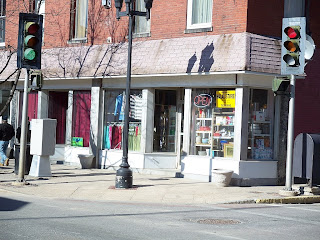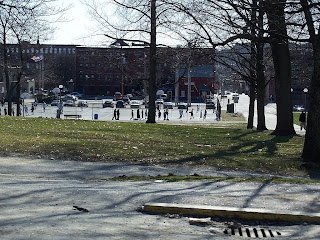 [Halal Store: A key gathering spot, located at Chestnut and Lisbon Streets]
[Halal Store: A key gathering spot, located at Chestnut and Lisbon Streets] [Kennedy Park; where many downtown residents congregate]
[Kennedy Park; where many downtown residents congregate]In Robert Putnam’s book, Bowling Alone: The Collapse and Arrival of American Community, the Harvard sociologist details how we have become increasingly disconnected from family, friends, neighbors, and our democratic structures. Putnam warns us that our stock of social capital—the essence and fabric of how we are connected within our communities—has fallen off and this poses grave danger to our nation’s long-term wellbeing.
Fortunately, Putnam doesn’t leave us teetering at the edge of the cliff, as his later book (co-written with Lewis Feldstein and Donald J. Cohen) provides examples of communities where residents are finding ways to reconnect and rebuild the store of social capital.
Interestingly, as cities like Lewiston have gone through difficult times, economically, many residents have fled downtown, for suburban enclaves. These communities, with large lots and spacious homes, make it difficult to connect with neighbors.
My own example, living on three acres, in Durham, with neighbors I rarely talk to and don’t really know, is much different than some of the vibrant examples of community that I’ve witnessed in downtown Lewiston.
Last Friday, I was invited by friend and follow Empower Lewiston board member, Ismail Ahmed, for lunch at Halal Store, at the corner of Chestnut and Lisbon Streets. Entering the market and restaurant, we ordered our lunches of Festival (a combination of pasta, rice, mixed vegetables, sautéed with goat meat and shaved steak), accompanied with salad, fruit drink and fresh banana. This provided a wonderfully different and hearty lunch, as well as the opportunity to have a needed conversation with one of my favorite local residents and a leader in the community.
While the food was very tasty, rich with pungent spices and seasonings, the goat meat was a special treat. Even better was the sense that this local store was the hub of the Somali community, as men were arriving for lunch, from the local mosque. Immediately, they’d enter the store and greet one another. I must have been introduced to close to 10 new people, as well as greeting a few other men that I knew from my work in the larger community. Everyone was glad to see Ismail and catch up on his news.
Afterwards, Ismail explained that Halal is a place where news is exchanged. When he hasn’t been there for several weeks, people grow concerned, as there is a sense of connectedness that exists here, in downtown Lewiston that doesn’t always exist in our more homogenous suburban areas of Maine.
Being of French-Canadian heritage, on my mother’s side of the family, with a Memiere that used to live within the boundaries of the two census tracts that make up the EC/EZ, I was familiar with the city and the vibrancy that it had 35 years ago. I was reminded of that time, by the sense of energy and the obvious community that I witnessed in and around Halal Store.
I have always believed that diversity adds to the social capital of a community and I got to witness it firsthand, last Friday.
There are many other positive examples of community that resides with the boundaries of the EC. I hope that Voices from the EC becomes a way to tell some of the stories that illustrate community in downtown Lewiston.
3 comments:
For those not familiar with this new culture in Maine I have a few comments to make.
According to the Wikipedia website --Halal means:
"The use of the term varies between Arabic-speaking communities and non-Arabic-speaking ones.
In Arabic-speaking countries, the term is used to describe anything permissible under Islamic law, in contrast to haraam, that which is forbidden. This includes human behavior, speech communication, clothing, conduct, manner and dietary laws.
In non-Arabic-speaking countries, the term is most commonly used in the narrower context of just Muslim dietary laws, especially where meat and poultry are concerned, though it can be used for the more general meaning, as well. This dichotomy of usage is similar to the Hebrew term kosher."[citation needed]
So, this store is called Barwaqo Halal Store. Apart from being a place of buying religiously permissible food stuff, Somalis in Lewiston meet in these stores to exchange news about the Somalis in the Diaspora, homeland news, wire dollars, socialize, eat, and catch up with each other.
To most of the Somalis this is a place to bond and to further discuss social issues/politics etc.
Thank you Ismail and Jim. The diversity in our community is part of its richness. While many Americans lament the dispersed American family, we have within our midst a culture that values and honors community connectedness. Many of us use our cell phones, text messages, and try to connect in a digital way, but the Somali community goes one step further - or perhaps closer - by valuing the face-to-face connection that many of us long for. Perhaps we all have something to learn about social capital...
It has been with mixed feelings that I've been planning to return to Lewiston after being away for several years. Since discovering the empower Lewiston blog, I am feeling far greater anticipation regarding my return.
I greatly appreciate the work of Robert Putnam and believe that much of his wisdom is being and will continue to be applied in Lewiston/Auburn, and look forward to the implementation in this community of more of the ideas being developed and written about at the Sanguaro Seminar website (Civic Engagement in America) at: http://www.hks.harvard.edu/saguaro/
In these troubled economic times Lewiston/Auburn appears to be growing wealthy in "social capital."
Post a Comment